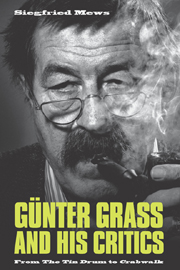Book contents
- Frontmatter
- Contents
- List of Abbreviations
- Introduction
- Part 1 Danzig, Center of the Universe
- Part 2 From Danzig to the Global Stage: Grass's Fiction of the 1970s and 1980s
- 5 Örtlich betäubt / Local Anaesthetic
- 6 Aus dem Tagebuch einer Schnecke / From the Diary of a Snail
- 7 Der Butt / The Flounder
- 8 Das Treffen in Telgte / The Meeting at Telgte
- 9 Kopfgeburten oder Die Deutschen sterben aus / Headbirths or The Germans Are Dying Out
- 10 Die Rättin / The Rat
- 11 Zunge zeigen / Show Your Tongue
- Part 3 After Reunification: Old Problems and New Beginnings
- Epilogue
- Works Cited
- Index
11 - Zunge zeigen / Show Your Tongue
from Part 2 - From Danzig to the Global Stage: Grass's Fiction of the 1970s and 1980s
Published online by Cambridge University Press: 05 February 2013
- Frontmatter
- Contents
- List of Abbreviations
- Introduction
- Part 1 Danzig, Center of the Universe
- Part 2 From Danzig to the Global Stage: Grass's Fiction of the 1970s and 1980s
- 5 Örtlich betäubt / Local Anaesthetic
- 6 Aus dem Tagebuch einer Schnecke / From the Diary of a Snail
- 7 Der Butt / The Flounder
- 8 Das Treffen in Telgte / The Meeting at Telgte
- 9 Kopfgeburten oder Die Deutschen sterben aus / Headbirths or The Germans Are Dying Out
- 10 Die Rättin / The Rat
- 11 Zunge zeigen / Show Your Tongue
- Part 3 After Reunification: Old Problems and New Beginnings
- Epilogue
- Works Cited
- Index
Summary
“The Revenge of Goddess Kali”
ZUNGE ZEIGEN, WHICH WAS PUBLISHED in the fall of 1988, is the result of Grass and his wife Ute's extended sojourn in India from August 1986 to January 1987. They stayed predominantly in Calcutta (Kolkata), capital of British India from 1772 to 1912 and today's capital of the state of West Bengal, a city that also plays a prominent role in the subchapter on Vasco da Gama in Der Butt (see ch. 7). Even more so than Die Rättin, Zunge zeigen is of indeterminate genre, inasmuch as it encompasses, in the German original, a prose text of approximately ninety pages, eighty drawings that are concentrated at the beginning, in the middle, and at the end, and a long epic poem of approximately twenty-three pages — in short, a text that confounded the expectations of some reviewers. Particularly those writing for the leading newspapers and magazines voiced their disapproval, which tends to be considerably more pronounced than in the case of Die Rättin. Thus Peter von Becker (1988) in Der Spiegel compares his own impressions of Calcutta with those of Grass and finds the author's text seriously wanting; in fact, he characterizes it as a “fantastic disaster” (154), even though he acknowledges Grass's recognition of Calcutta's role as a mirror of the global conflicts between the Third World and the First World, a place that displays the heritage of colonialism, the excesses of capitalism, and the helplessness of the socialist government in West Bengal.
- Type
- Chapter
- Information
- Günter Grass and his CriticsFrom 'The Tin Drum' to 'Crabwalk', pp. 235 - 246Publisher: Boydell & BrewerPrint publication year: 2008



